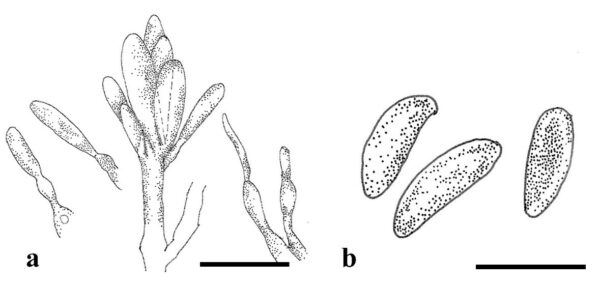Fungalpedia – Note 365, Sheathnema
Sheathnema Rashm. Dubey & Neelima
Citation when using this data: Tibpromma et al. 2024 (in prep.) – Fungalpedia, Ascomycota.
Index Fungorum, Facesoffungi, MycoBank, GenBank, Fig. 1
Classification: Incertae sedis, Incertae sedis, Incertae sedis, Incertae sedis, Pezizomycotina, Ascomycota, Fungi.
Sheathnema was established by Dubey & Moonnambeth (2014) with the type species Sheathnema indicum, and the type specimens was collected from the leaves and other aerial parts of Pandanus tectorious from the forest area. Sheathnema was separated from related taxa by distinct morphological characteristics, such as Spiropes, Dematophora, Tharoopama, Phaeoisariopsis, Graphium, Leptographium and various other synematous forms. The colony is epiphyllous, displaying a dense and velvety texture. The hyphae are straight to effuse, exhibiting a dark blackish-brown coloration and tufted structures. Fruiting bodies, synematous-like. The synemata are dark brown, erect, and curved at the apex, resembling a boomerang. During the early stages, they are entirely enveloped by a dark brown, infertile sheath. While at the mature stage the upper part of synemata bearing conidiophores conidia hyaline to sub hyaline, 3-septate clavate to subclavate, rounded at the apex, tapered to the base, smooth (Dubey et al. 2014). No sequences are available in this genus, and fresh collections are needed.
Type species: Sheathnema indicum Dubey & Moonnambeth
Other accepted species: This genus is monotypic.
Figure 1 – Morphology of Sheathnema. a Conidia and conidiophores. b Conidia. Scale bar: a, b = 10 μm. Redrawn from Dubey et al. (2014).
References
Entry by
Yang EF, Department of Biology, Faculty of Science, Chiang Mai University, Chiang Mai 50200, Thailand; Center for Yunnan Plateau Biological Resources Protection and Utilization, College of Biological Resource and Food Engineering, Qujing Normal University, Qujing, Yunnan 655011, China.
(Edited by Saowaluck Tibpromma, Samaneh Chaharmiri-Dokhaharani, & Achala R. Rathnayaka)
Published online 14 November 2024
